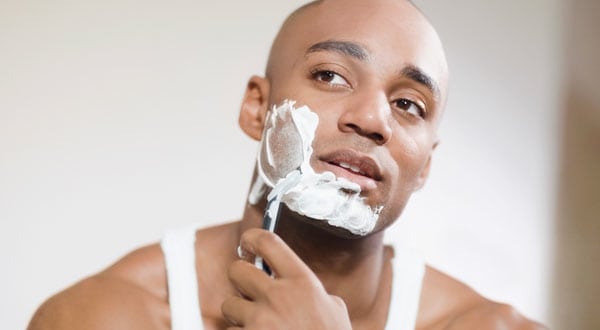
SKIN CARE FOR BLACK MEN
 African-American skin is dark because of its large amount of melanin. Melanin is the pigment that protects skin from sunlight, which is why older people with black skin tend to look younger than their Caucasian peers. But African-American skin requires special care, as it can become patchy, irregularly colored, and easily inflamed. Black men who shave have additional skin care concerns. Here are some simple skin care tips for African-American men:
African-American skin is dark because of its large amount of melanin. Melanin is the pigment that protects skin from sunlight, which is why older people with black skin tend to look younger than their Caucasian peers. But African-American skin requires special care, as it can become patchy, irregularly colored, and easily inflamed. Black men who shave have additional skin care concerns. Here are some simple skin care tips for African-American men:
- Wash your face twice daily with a facial cleanser that matches your skin type — oily, dry, combination, or normal. Do this in the morning and just before bed. Never use hot water while cleansing your face, because it can dry out African-American men’s skin.
- Since African-American men’s skin tends to be more oily, use a foaming or milk-based cleanser that can remove dirt and oil while retaining moisture.
- Some African-American men’s facial skin, however, is noticeably dry, in which case it is best to use cleansing products that contain soy proteins, shea butter, or aloe vera.
- Exfoliating is especially important for African-American men’s skin, as it tends to blemish easily. Dead skin cells tend to accumulate on the skin, leaving it rough and uneven, with blocked or enlarged pores. Use a gentle exfoliating scrub with glycolic or citrus acid twice a week to keep black skin even and smooth and bacteria-free. v Protect your skin from the sun. This may sound unnecessary, but the truth is that long-term sun exposure puts African-American men at risk of skin cancer, despite their naturally high levels of melanin. Wear a high-quality sunblock all year long to keep black skin safe.
- Shaving can cause problems for African-American men. The wiry, curly hair on the face and neck tends to burrow into the skin adjacent to the hair follicles, which can lead to razor bumps, itching, and burning and make shaving a painful task that many black men choose to avoid altogether. So shave with the grain (in the direction of the hair growth), not against it, on extra moist skin, and tweeze ingrown hairs promptly.
- Inspect your skin monthly for changes such as discoloration, spots, or lumps. These can be difficult for African-American men to recognize, but if something looks “different” to you, consult a dermatologist.
- Consider using skin care products specifically formulated for African-American or black skin. Some high-quality product lines can help address specific skin problems.
With a little vigilance and some TLC, African-American men can keep their skin healthy and smooth.
[print_gllr id=19457]
Latest posts by DELUX Magazine (see all)
- Aziel Jackson – In His Own Words: Making His “FIRST MOVE” in Fashion - Thursday, March 14, 2024
- Miami Dolphins’ Stand-Out Terron Armstead Continues To Win In The Art of Giving-Back - Monday, June 5, 2023
- Delux Feature: Celebrity Barber and Fitness Trainer, Lawrence Roebuck, Shares His Tips for a Healthier Lifestyle During Stress Awareness Month - Monday, May 8, 2023






